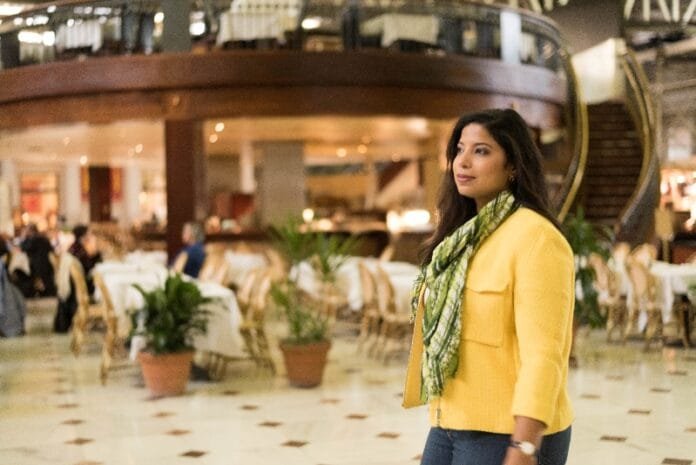So what makes this travel blogger qualified to ramble about travel safety tips….. As many of you know, many of my travels stem from my work as a Marine Officer overseas and my expat life in Brussels as a NATO staff member. On both jobs, I have had extensive training in security and anti-terrorism/force protection. As the security manager at my agency in Brussels, part of my role was to inform our staff members about threats not only at work but also keep our team informed on how to stay safe outside the office. As a Marine, my roles have been varied-from providing travel briefs to General Officers to manage telecommunications networks for first responders for large-scale events such as the Marine Corps Marathon. Thankfully after all this training, I am still about solo travel from time to time…as long as I take certain safety measures.

Photo by Nikky Richardson Photography
2015 has not been a good year for the travel industry. With unfortunate events such as the Paris and Beirut terror attacks, I know personally of people who have cancelled their trips. Sadly, we look at acts of terror and hindsight is always 20/20. The best thing we can do is to be prepared if something does happen to us.
My key travel safety tips I have learned from my fifteen years on the road:
Keep Someone Informed of Your Plans: The whole thought of wandering on your own sounds romantic but then again, look what happened to the guy of “Into the Wild”. There’s nothing wrong with traveling alone, but I highly suggest you keep someone informed of your plans or any changes that come along. Share your itinerary with your significant other, friends, colleagues, or parents. If there is an attack or a natural disaster, they can quickly contact the authorities or your country’s embassy.

Register with the Embassy: If you’re an American, you can enroll in the Smart Traveler Enrollment Program online before you travel or as an expat. When I lived in Brussels, I appreciated the emails I used to get from the US Embassy about any issues ongoing in the city, such as protests that may hinder traffic and mobility within the city. Also, each embassy also has information on scams or things that you should look out for while traveling. As an American, I can share firsthand about my experience with the US Embassy but I know that many countries offer similar services. Most importantly, being registered ensures that you are accounted for in case of an emergency at your destination.
Communicate: I love my Simple Choice Plan from T-Mobile. It allows me to use 3G free data and unlimited text internationally. When I traveled to Taipei earlier this year, I would send my husband quick texts via WhatsApp to let him know what I was up to, especially when I was out late exploring the night markets. Google Translate is also a great tool to have. You can type into the app and it can turn it into the voice of your language of choice. Useful if you need to deal with authorities.

Know how to contact the authorities: Yes, in the USA you can reach the police via 911. EU emergency phone number across all member nations is 112. The emergency number in Japan is 119. It’s a good idea to have these numbers on hand and programmed into your phone before traveling.
Who’s Trying to Get Information? There have been plenty of great people who I have met on the road, whether it’s at a restaurant, market, or bar. However, be aware if someone you have encountered is asking too many questions. Ask yourself: “does this person need to know where I’m staying?” “Does he/she need to know that I am traveling alone?” I recall being in Sydney years ago at a bar with two of my coworkers. A random guy started chatting us up and then started asking questions about our jobs. One of my colleagues clearly looked like a military guy. We knew it was time to switch up the conversation and gracefully move to another spot. Most people are genuinely curious but trust your gut.

Do you know where you’re going? Sometimes the best experiences are the ones we don’t plan, however, it’s smart to have an outline, especially on a multi-leg trip. In case of a natural disaster at your destination, do you know the evacuation routes? What are the closest airports or train stations? This takes just a few minutes to Google but can save you time and effort in case of an emergency.
Be Vigilant: In Brussels, pickpocketing is a common practice. I had plenty of my colleagues that came into my office with reports about being robbed. I was a victim myself after my car was broken into twice. Make sure to have all of your belongings close to your body. That’s why I am not a fan of a backpack, especially if taking public transportation. Totes or crossbody work best. Also, make sure you have positive control of your bags at all times. Another trick I’ve seen too often is that a perpetrator will run by and cut the strap. If renting a car, make sure you keep your purse either in the locked trunk or on the driver’s side. A common offense in cities like Brussels is perpetrators breaking the passenger seat and snatching the purse/bag while someone waits at the stoplight.
Luggage tags: One of the things that make me cringe is when I see travelers or even people on the metro (especially those in military uniform) who have an open luggage tag with their address in plain view. This gives easy access to perpetrators to know where you live.

Photo via Henri Bendel Website
Know your destination: Aside from doing your research, ask a local friend or the hotel staff about safety practices. For example, in San Juan you can treat a stoplight as a stop after 11pm in order to keep the vehicle moving and staying safe. During one of my trips in Spain, there was a warning about criminals throwing eggs at windshields of cars to make vehicles pull over and then rob the victims. Again, you can get a lot of this information via the local embassy website.
Change it up: Many of us are creatures of habit, but especially during a long trip, change your habits up. Go to a different bus stop to get to work at different times. If you are a target for a robbery or an attack, it will be easier for a criminal to find you if they know your routine.
Valuables: Make sure your valuables are locked up in a safe. Also make a file on dropbox of essential numbers of your bank, embassy, airlines in case your wallet or passport get stolen. Travel Insurance is a good thing to have. Many travel credit cards provide travel insurance as well. In the unfortunate case you do get robbed, make sure to get a police report as many insurance companies will require it in order to file a claim and be properly compensated.
Know the local laws: Did you know that in many countries you can be detained without any right to a lawyer? Or that you may be detained for a certain amount of time before they have to inform your country? Some countries require a specific dress code, especially for women. Be aware of the laws, especially in developing nations in which laws can be vague at times. Unfortunately, I had to deal with my employees being detained by foreign police while living abroad. They have an advantage as you are just a visitor. Don’t compromise your freedom, even if you don’t believe in those particular laws.
Driving: Do you know if you need an international license when renting a car at your destination? Are you comfortable driving on the left side of the road? Renting RVs is becoming more popular. Ask yourself: “do you need a special license to drive an RV?” before going on your adventure.

Trust your gut! This is one of my main travel safety tips. If there is something about a person you meet on the road that doesn’t give you a good vibe, trust your gut. There’s a fine line between being courteous and being naive. I encourage people to explore local neighborhoods or places beyond the beaten path. However, those experiences are best done with someone else or a walking tour if you’re traveling solo.
Latergram: I know this one is challenging, especially from a blogger’s perspective as we are expected to capture our travel experiences in the moment on social media. When I am traveling alone, I make my social media posts after the fact. Even when I am traveling with my husband, friends, or group I use my judgement in terms of real-time posting. If traveling on business, I suggest you check with your company or agency security officer and get their social media policy.
Despite the threats we face around the world, I think there is no better time to travel than now. I think about my first time traveling abroad to Germany 15 years ago. I was traveling alone-there were no apps, no google maps, no google translate. Things are so much more connected now. Take advantage of that, prepare ahead, read my travel safety tips and see the world.









Great stuff! That it was written by well-traveled, globetrotting fellow Latina military veteran makes it even better. 🙂 I personally will NEVER stop traveling. For me and my family, traveling IS life! Keep up the great work!
Thanks Graciela! I feel the same way!
Excellent advice Jessica! I’m sharing this with everyone 🙂
Thanks Nancy!
Comments are closed.